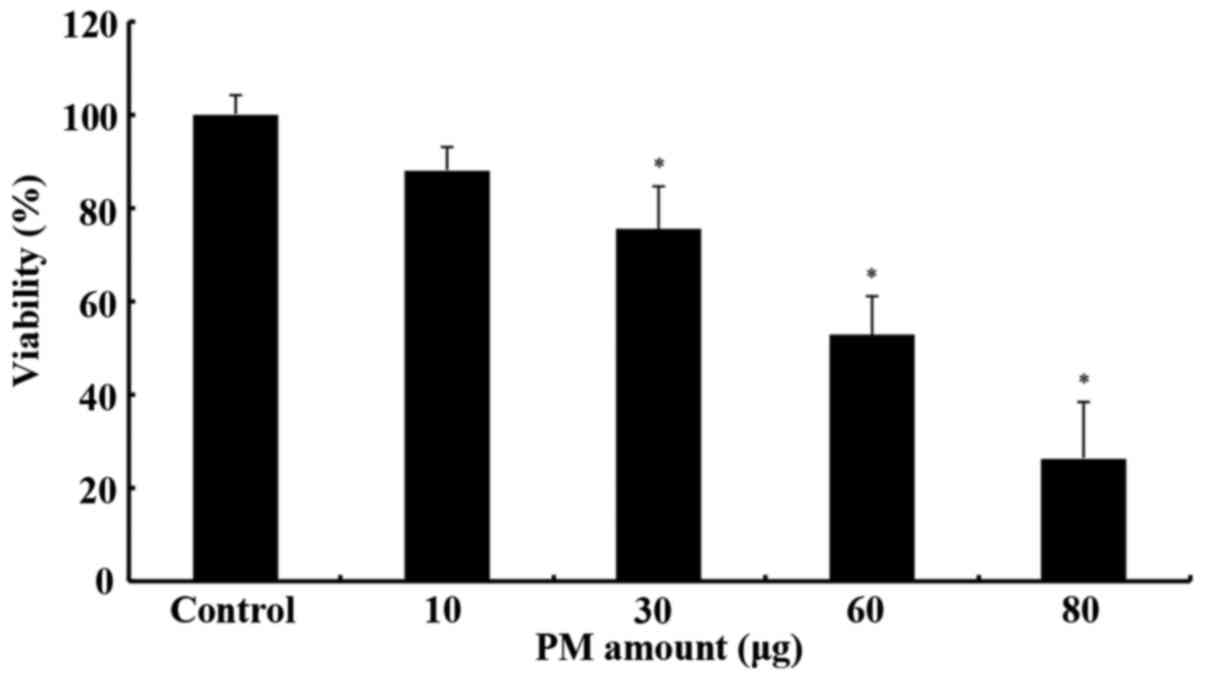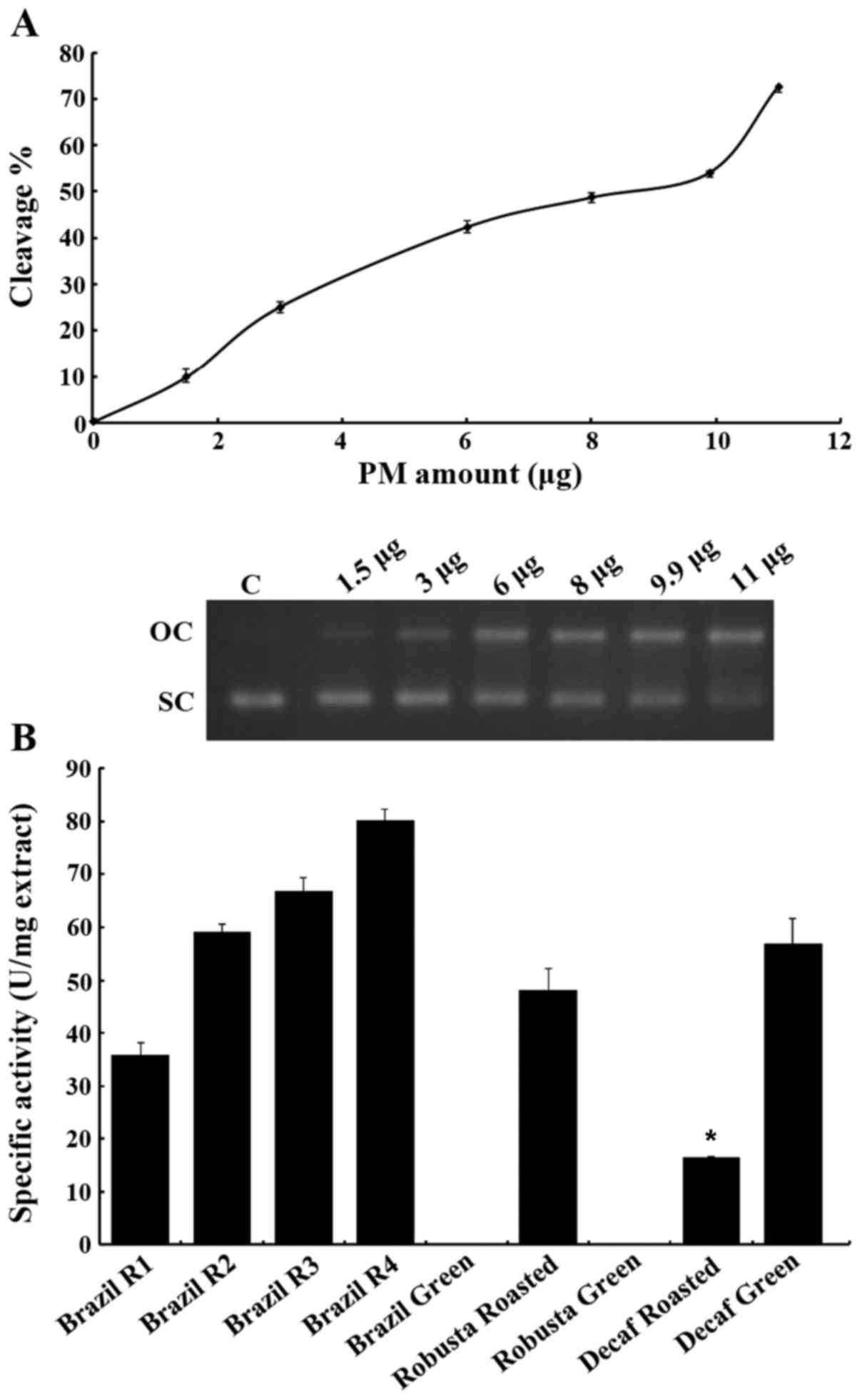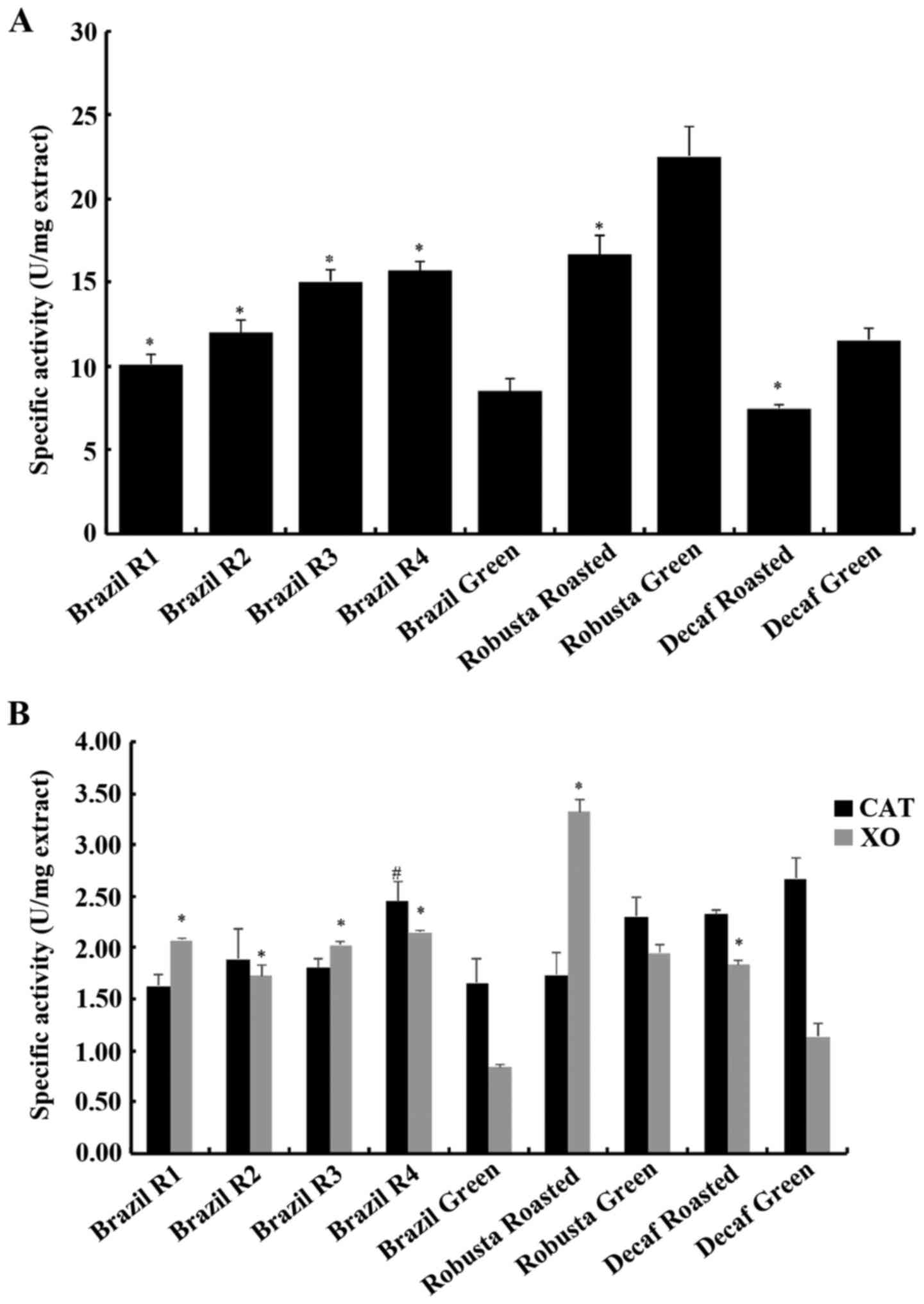|
1
|
Schieber M and Chandel NS: ROS function in
redox signaling and oxidative stress. Curr Biol. 24:R453–R462.
2014. View Article : Google Scholar : PubMed/NCBI
|
|
2
|
Ray PD, Huang BW and Tsuji Y: Reactive
oxygen species (ROS) homeostasis and redox regulation in cellular
signaling. Cell Signal. 24:981–990. 2012. View Article : Google Scholar : PubMed/NCBI
|
|
3
|
Elias RJ, Kellerby SS and Decker EA:
Antioxidant activity of proteins and peptides. Crit Rev Food Sci
Nutr. 48:430–441. 2008. View Article : Google Scholar : PubMed/NCBI
|
|
4
|
Birben E, Sahiner UM, Sackesen C, Erzurum
S and Kalayci O: Oxidative stress and antioxidant defense. World
Allergy Organ J. 5:9–19. 2012. View Article : Google Scholar : PubMed/NCBI
|
|
5
|
Halliwell B: Free Radicals and Other
Reactive Species in DiseaseeLS. John Wiley & Sons, Ltd.;
Chichester, UK: 2001
|
|
6
|
Sosa V, Moliné T, Somoza R, Paciucci R,
Kondoh H and LLeonart ME: Oxidative stress and cancer: An overview.
Ageing Res Rev. 12:376–390. 2013. View Article : Google Scholar : PubMed/NCBI
|
|
7
|
Rochette L, Zeller M, Cottin Y and Vergely
C: Diabetes, oxidative stress and therapeutic strategies. Biochim
Biophys Acta. 1840:2709–2729. 2014. View Article : Google Scholar : PubMed/NCBI
|
|
8
|
Wang X, Wang W, Li L, Perry G, Lee HG and
Zhu X: Oxidative stress and mitochondrial dysfunction in
Alzheimer's disease. Biochim Biophys Acta. 1842:1240–1247. 2014.
View Article : Google Scholar : PubMed/NCBI
|
|
9
|
World Health Organisation (WHO), . Media
centre. Ambient (outdoor) air quality and health. WHO; Geneva: pp.
1–7. 2014
|
|
10
|
Brook RD, Rajagopalan S, CA III Pope,
Brook JR, Bhatnagar A, Diez-Roux AV, Holguin F, Hong Y, Luepker RV,
Mittleman MA, et al: American Heart Association Council on
Epidemiology and Prevention, Council on the Kidney in
Cardiovascular Disease, and Council on Nutrition, Physical Activity
and Metabolism: Particulate matter air pollution and cardiovascular
disease: An update to the scientific statement from the American
Heart Association. Circulation. 121:2331–2378. 2010. View Article : Google Scholar : PubMed/NCBI
|
|
11
|
Franklin BA, Brook R and Arden Pope C III:
Air pollution and cardiovascular disease. Curr Probl Cardiol.
40:207–238. 2015. View Article : Google Scholar : PubMed/NCBI
|
|
12
|
Arbex MA, Ude P Santos, Martins LC,
Saldiva PHN, Pereira LAA and Braga ALF: Air pollution and the
respiratory system. J Bras Pneumol. 38:643–655. 2012. View Article : Google Scholar : PubMed/NCBI
|
|
13
|
Borgie M, Ledoux F, Verdin A, Cazier F,
Greige H, Shirali P, Courcot D and Dagher Z: Genotoxic and
epigenotoxic effects of fine particulate matter from rural and
urban sites in Lebanon on human bronchial epithelial cells. Environ
Res. 136:352–362. 2015. View Article : Google Scholar : PubMed/NCBI
|
|
14
|
Billet S, Abbas I, Le Goff J, Verdin A,
André V, Lafargue PE, Hachimi A, Cazier F, Sichel F, Shirali P, et
al: Genotoxic potential of Polycyclic Aromatic Hydrocarbons-coated
onto airborne Particulate Matter (PM 2.5) in human lung epithelial
A549 cells. Cancer Lett. 270:144–155. 2008. View Article : Google Scholar : PubMed/NCBI
|
|
15
|
Golokhvast KS, Chernyshev VV, Chaika VV,
Ugay SM, Zelinskaya EV, Tsatsakis AM, Karakitsios SP and
Sarigiannis DA: Size-segregated emissions and metal content of
vehicle-emitted particles as a function of mileage: Implications to
population exposure. Environ Res. 142:479–485. 2015. View Article : Google Scholar : PubMed/NCBI
|
|
16
|
Chen LC and Lippmann M: Effects of metals
within ambient air particulate matter (PM) on human health. Inhal
Toxicol. 21:1–31. 2009. View Article : Google Scholar : PubMed/NCBI
|
|
17
|
Tanaka M, Takano H, Fujitani Y, Hirano S,
Ichinose T, Shimada A and Inoue KI: Effects of exposure to
nanoparticle-rich diesel exhaust on 8-OHdG synthesis in the mouse
asthmatic lung. Exp Ther Med. 6:703–706. 2013.PubMed/NCBI
|
|
18
|
Sarigiannis DΑ, Karakitsios SP and
Kermenidou MV: Health impact and monetary cost of exposure to
particulate matter emitted from biomass burning in large cities.
Sci Total Environ. 524–525, 319–330. 2015.
|
|
19
|
Sarigiannis DΑ, Karakitsios SP, Kermenidou
M, Nikolaki S, Zikopoulos D, Semelidis S, Papagiannakis A and
Tzimou R: Total exposure to airborne particulate matter in cities:
The effect of biomass combustion. Sci Total Environ. 493:795–805.
2014. View Article : Google Scholar : PubMed/NCBI
|
|
20
|
Sarigiannis D, Kyriakou S, Kermenidou M
and Karakitsios S: The reactive oxidative potential from biomass
emitted particulate matter (PM10, PM2.5 & PM1) and its impact
on human health. Proceedings of the 18th International Symposium on
Environmental Pollution and its Impact on Life in the Mediterranean
Region. Mediterranean Scientific Association of Environmental
Protection, Crete. 2015.
|
|
21
|
Sarigiannis DΑ, Karakitsios SP, Zikopoulos
D, Nikolaki S and Kermenidou M: Lung cancer risk from PAHs emitted
from biomass combustion. Environ Res. 137:147–156. 2015. View Article : Google Scholar : PubMed/NCBI
|
|
22
|
Albuquerque-Silva I, Vecellio L, Durand M,
Avet J, Le Pennec D, De Monte M, Montharu J, Diot P, Cottier M,
Dubois F, et al: Particle deposition in a child respiratory tract
model: In vivo regional deposition of fine and ultrafine aerosols
in baboons. PLoS One. 9:e954562014. View Article : Google Scholar : PubMed/NCBI
|
|
23
|
Bølling A Kocbach, Pagels J, Yttri KE,
Barregard L, Sallsten G, Schwarze PE and Boman C: Health effects of
residential wood smoke particles: The importance of combustion
conditions and physicochemical particle properties. Part Fibre
Toxicol. 6:292009. View Article : Google Scholar : PubMed/NCBI
|
|
24
|
Cachon BF, Firmin S, Verdin A, Ayi-Fanou
L, Billet S, Cazier F, Martin PJ, Aissi F, Courcot D, Sanni A, et
al: Proinflammatory effects and oxidative stress within human
bronchial epithelial cells exposed to atmospheric particulate
matter (PM(2.5) and PM(>2.5)) collected from Cotonou, Benin.
Environ Pollut. 185:340–351. 2014. View Article : Google Scholar : PubMed/NCBI
|
|
25
|
Lodovici M and Bigagli E: Oxidative stress
and air pollution exposure. J Toxicol. 2011:4870742011. View Article : Google Scholar : PubMed/NCBI
|
|
26
|
Zakharenko AM, Engin AB, Chernyshev VV,
Chaika VV, Ugay SM, Rezaee R, Karimi G, Drozd VA, Nikitina AV,
Solomennik SF, et al: Basophil mediated pro-allergic inflammation
in vehicle-emitted particles exposure. Environ Res. 152:308–314.
2017. View Article : Google Scholar : PubMed/NCBI
|
|
27
|
Golokhvast K, Vitkina T, Gvozdenko T,
Kolosov V, Yankova V, Kondratieva E, Gorkavaya A, Nazarenko A,
Chaika V, Romanova T, et al: Impact of Atmospheric Microparticles
on the Development of Oxidative Stress in Healthy City/Industrial
Seaport Residents. Oxid Med Cell Longev. 2015:4121732015.
View Article : Google Scholar : PubMed/NCBI
|
|
28
|
Boisa N, Entwistle J and Dean JR: A new
simple, low-cost approach for generation of the PM10 fraction from
soil and related materials: Application to human health risk
assessment. Anal Chim Acta. 852:97–104. 2014. View Article : Google Scholar : PubMed/NCBI
|
|
29
|
Higdon JV and Frei B: Coffee and health: A
review of recent human research. Crit Rev Food Sci Nutr.
46:101–123. 2006. View Article : Google Scholar : PubMed/NCBI
|
|
30
|
Murthy PS and Naidu MM: Recovery of
Phenolic Antioxidants and Functional Compounds from Coffee Industry
By-Products. Food Bioprocess Technol. 5:897–903. 2012. View Article : Google Scholar
|
|
31
|
Sato Y, Itagaki S, Kurokawa T, Ogura J,
Kobayashi M, Hirano T, Sugawara M and Iseki K: In vitro and in vivo
antioxidant properties of chlorogenic acid and caffeic acid. Int J
Pharm. 403:136–138. 2011. View Article : Google Scholar : PubMed/NCBI
|
|
32
|
Xu JG, Hu QP and Liu Y: Antioxidant and
DNA-protective activities of chlorogenic acid isomers. J Agric Food
Chem. 60:11625–11630. 2012. View Article : Google Scholar : PubMed/NCBI
|
|
33
|
Henry-Vitrac C, Ibarra A, Roller M,
Mérillon JM and Vitrac X: Contribution of chlorogenic acids to the
inhibition of human hepatic glucose-6-phosphatase activity in vitro
by Svetol, a standardized decaffeinated green coffee extract. J
Agric Food Chem. 58:4141–4144. 2010. View Article : Google Scholar : PubMed/NCBI
|
|
34
|
Priftis A, Stagos D, Konstantinopoulos K,
Tsitsimpikou C, Spandidos DA, Tsatsakis AM, Tzatzarakis MN and
Kouretas D: Comparison of antioxidant activity between green and
roasted coffee beans using molecular methods. Mol Med Rep.
12:7293–7302. 2015.PubMed/NCBI
|
|
35
|
Yen GC and Duh DP: Scavenging Effect of
Methanolic Extracts of Peanut Hulls on Free-Radical and
Active-Oxygen Species. J Agric Food Chem. 42:629–632. 1994.
View Article : Google Scholar
|
|
36
|
Aebi H: Catalase in vitro. Methods
Enzymol. 105:121–126. 1984. View Article : Google Scholar : PubMed/NCBI
|
|
37
|
Dieterich S, Bieligk U, Beulich K,
Hasenfuss G and Prestle J: Gene expression of antioxidative enzymes
in the human heart: Increased expression of catalase in the
end-stage failing heart. Circulation. 101:33–39. 2000. View Article : Google Scholar : PubMed/NCBI
|
|
38
|
Cos P, Ying L, Calomme M, Hu JP, Cimanga
K, Van Poel B, Pieters L, Vlietinck AJ and Vanden Berghe D:
Structure-activity relationship and classification of flavonoids as
inhibitors of xanthine oxidase and superoxide scavengers. J Nat
Prod. 61:71–76. 1998. View Article : Google Scholar : PubMed/NCBI
|
|
39
|
Velali E, Papachristou E, Pantazaki A,
Choli-Papadopoulou T, Planou S, Kouras A, Manoli E, Besis A, Voutsa
D and Samara C: Redox activity and in vitro bioactivity of the
water-soluble fraction of urban particulate matter in relation to
particle size and chemical composition. Environ Pollut. 208(Pt B):
774–786. 2016. View Article : Google Scholar : PubMed/NCBI
|
|
40
|
Terzano C, Di Stefano F, Conti V, Graziani
E and Petroianni A: Air pollution ultrafine particles: Toxicity
beyond the lung. Eur Rev Med Pharmacol Sci. 14:809–821.
2010.PubMed/NCBI
|
|
41
|
Chang ST, Wu JH, Wang SY, Kang PL, Yang NS
and Shyur LF: Antioxidant activity of extracts from Acacia confusa
bark and heartwood. J Agric Food Chem. 49:3420–3424. 2001.
View Article : Google Scholar : PubMed/NCBI
|
|
42
|
Valavanidis A, Vlahoyianni T and Fiotakis
K: Comparative study of the formation of oxidative damage marker
8-hydroxy-2′-deoxyguanosine (8-OHdG) adduct from the nucleoside
2′-deoxyguanosine by transition metals and suspensions of
particulate matter in relation to metal content and redox
reactivity. Free Radic Res. 39:1071–1081. 2005. View Article : Google Scholar : PubMed/NCBI
|
|
43
|
Imlay JA, Chin SM and Linn S: Toxic DNA
damage by hydrogen peroxide through the Fenton reaction in vivo and
in vitro. Science. 240:640–642. 1988. View Article : Google Scholar : PubMed/NCBI
|
|
44
|
Longhin E, Pezzolato E, Mantecca P, Holme
JA, Franzetti A, Camatini M and Gualtieri M: Season linked
responses to fine and quasi-ultrafine Milan PM in cultured cells.
Toxicol In Vitro. 27:551–559. 2013. View Article : Google Scholar : PubMed/NCBI
|
|
45
|
Delfino RJ, Staimer N, Tjoa T, Arhami M,
Polidori A, Gillen DL, Kleinman MT, Schauer JJ and Sioutas C:
Association of biomarkers of systemic inflammation with organic
components and source tracers in quasi-ultrafine particles. Environ
Health Perspect. 118:756–762. 2010. View Article : Google Scholar : PubMed/NCBI
|
|
46
|
Gehling W, Khachatryan L and Dellinger B:
Hydroxyl radical generation from environmentally persistent free
radicals (EPFRs) in PM2.5. Environ Sci Technol. 48:4266–4272. 2014.
View Article : Google Scholar : PubMed/NCBI
|
|
47
|
Farias MS, Pich CT, Kviecinski MR, Bucker
NC, Felipe KB, Da Silva FO, Günther TM, Correia JF, Ríos D, Benites
J, et al: Substituted 3-acyl-2-phenylamino-1,4-naphthoquinones
intercalate into DNA and cause genotoxicity through the increased
generation of reactive oxygen species culminating in cell death.
Mol Med Rep. 10:405–410. 2014.PubMed/NCBI
|
|
48
|
Dellinger B, Pryor WA, Cueto R, Squadrito
GL, Hegde V and Deutsch WA: Role of free radicals in the toxicity
of airborne fine particulate matter. Chem Res Toxicol.
14:1371–1377. 2001. View Article : Google Scholar : PubMed/NCBI
|
|
49
|
Squadrito GL, Cueto R, Dellinger B and
Pryor WA: Quinoid redox cycling as a mechanism for sustained free
radical generation by inhaled airborne particulate matter. Free
Radic Biol Med. 31:1132–1138. 2001. View Article : Google Scholar : PubMed/NCBI
|
|
50
|
Alaghmand M and Blough NV:
Source-dependent variation in hydroxyl radical production by
airborne particulate matter. Environ Sci Technol. 41:2364–2370.
2007. View Article : Google Scholar : PubMed/NCBI
|
|
51
|
Valavanidis A, Fiotakis K, Bakeas E and
Vlahogianni T: Electron paramagnetic resonance study of the
generation of reactive oxygen species catalysed by transition
metals and quinoid redox cycling by inhalable ambient particulate
matter. Redox Rep. 10:37–51. 2005. View Article : Google Scholar : PubMed/NCBI
|
|
52
|
Khachatryan L, Vejerano E, Lomnicki S and
Dellinger B: Environmentally persistent free radicals (EPFRs). 1.
Generation of reactive oxygen species in aqueous solutions. Environ
Sci Technol. 45:8559–8566. 2011. View Article : Google Scholar : PubMed/NCBI
|
|
53
|
Bouayed J and Bohn T: Exogenous
antioxidants - Double-edged swords in cellular redox state: Health
beneficial effects at physiologic doses versus deleterious effects
at high doses. Oxid Med Cell Longev. 3:228–237. 2010. View Article : Google Scholar : PubMed/NCBI
|
|
54
|
Perrone D, Farah A and Donangelo CM:
Influence of coffee roasting on the incorporation of phenolic
compounds into melanoidins and their relationship with antioxidant
activity of the brew. J Agric Food Chem. 60:4265–4275. 2012.
View Article : Google Scholar : PubMed/NCBI
|
|
55
|
Smrke S, Opitz SEW, Vovk I and Yeretzian
C: How does roasting affect the antioxidants of a coffee brew?
Exploring the antioxidant capacity of coffee via on-line
antioxidant assays coupled with size exclusion chromatography. Food
Funct. 4:1082–1092. 2013. View Article : Google Scholar : PubMed/NCBI
|
|
56
|
Bakuradze T, Lang R, Hofmann T, Stiebitz
H, Bytof G, Lantz I, Baum M, Eisenbrand G and Janzowski C:
Antioxidant effectiveness of coffee extracts and selected
constituents in cell-free systems and human colon cell lines. Mol
Nutr Food Res. 54:1734–1743. 2010. View Article : Google Scholar : PubMed/NCBI
|
|
57
|
Borges F, Fernandes E and Roleira F:
Progress towards the discovery of xanthine oxidase inhibitors. Curr
Med Chem. 9:195–217. 2002. View Article : Google Scholar : PubMed/NCBI
|
|
58
|
Krenitsky TA, Spector T and Hall WW:
Xanthine oxidase from human liver: Purification and
characterization. Arch Biochem Biophys. 247:108–119. 1986.
View Article : Google Scholar : PubMed/NCBI
|
|
59
|
Houston M, Estevez A, Chumley P, Aslan M,
Marklund S, Parks DA and Freeman BA: Binding of xanthine oxidase to
vascular endothelium. Kinetic characterization and oxidative
impairment of nitric oxide-dependent signaling. J Biol Chem.
274:4985–4994. 1999. View Article : Google Scholar : PubMed/NCBI
|
|
60
|
Choi EY, Stockert AL, Leimkühler S and
Hille R: Studies on the mechanism of action of xanthine oxidase. J
Inorg Biochem. 98:841–848. 2004. View Article : Google Scholar : PubMed/NCBI
|
|
61
|
de Oliveira EP and Burini RC: High plasma
uric acid concentration: Causes and consequences. Diabetol Metab
Syndr. 4:122012. View Article : Google Scholar : PubMed/NCBI
|
|
62
|
Gomez-Cabrera MC, Borrás C, Pallardó FV,
Sastre J, Ji LL and Viña J: Decreasing xanthine oxidase-mediated
oxidative stress prevents useful cellular adaptations to exercise
in rats. J Physiol. 567:113–120. 2005. View Article : Google Scholar : PubMed/NCBI
|
|
63
|
Day RO, Kamel B, Kannangara DRW, Williams
KM and Graham GG: Xanthine oxidoreductase and its inhibitors:
Relevance for gout. Clin Sci (Lond). 130:2167–2180. 2016.
View Article : Google Scholar : PubMed/NCBI
|
|
64
|
Viana ALM, Fonseca M, Meireles EL, Duarte
SM, Rodrigues MR and Paula FB: Effects of the consumption of
caffeinated and decaffeinated instant coffee beverages on oxidative
stress induced by strenuous exercise in rats. Plant Foods Hum Nutr.
67:82–87. 2012. View Article : Google Scholar : PubMed/NCBI
|
|
65
|
Abreu RV, Silva-Oliveira EM, Moraes MFD,
Pereira GS and Moraes-Santos T: Chronic coffee and caffeine
ingestion effects on the cognitive function and antioxidant system
of rat brains. Pharmacol Biochem Behav. 99:659–664. 2011.
View Article : Google Scholar : PubMed/NCBI
|
|
66
|
Pisoschi AM and Pop A: The role of
antioxidants in the chemistry of oxidative stress: A review. Eur J
Med Chem. 97:55–74. 2015. View Article : Google Scholar : PubMed/NCBI
|
|
67
|
Pal S, Dey SK and Saha C: Inhibition of
catalase by tea catechins in free and cellular state: a biophysical
approach. PLoS One. 9:e1024602014. View Article : Google Scholar : PubMed/NCBI
|
|
68
|
De Magalhães CS, Takarada JE, Carvalho NC,
do Carvalho DC, De Andrade FL, Ferreira EB, Luccas PO and Azevedo
L: The Coffee Protective Effect on Catalase System in the
Preneoplastic Induced Rat Liver. J Chem. 2016:85703212016.
View Article : Google Scholar
|
|
69
|
Honda S, Miura Y, Masuda A and Masuda T:
Identification of crypto- and neochlorogenic lactones as potent
xanthine oxidase inhibitors in roasted coffee beans. Biosci
Biotechnol Biochem. 78:2110–2116. 2014. View Article : Google Scholar : PubMed/NCBI
|
|
70
|
Farah A, Monteiro M, Donangelo CMLS and
Lafay S: Chlorogenic acids from green coffee extract are highly
bioavailable in humans. J Nutr. 138:2309–2315. 2008. View Article : Google Scholar : PubMed/NCBI
|

















